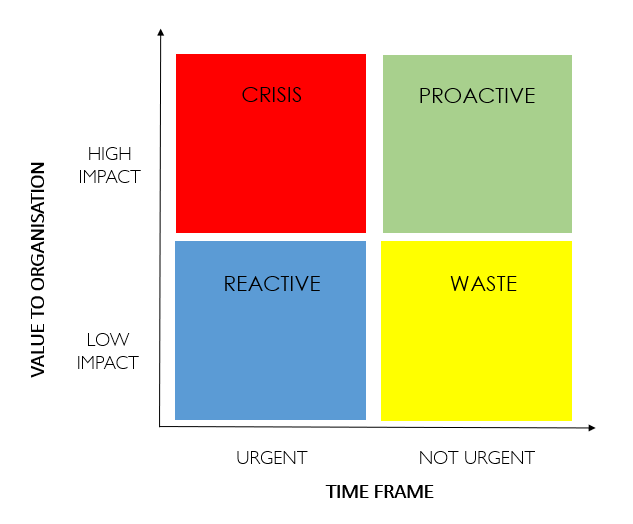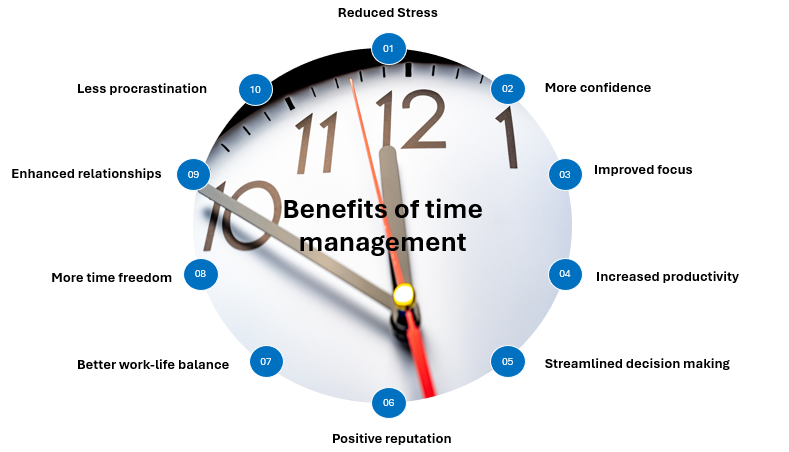- Home
- 7 Steps of Goal Setting
- Mastering Stress and Time Management
mastering stress and time management
Can you remember a time when you were so stressed that you didn't know which tasks to do next? Or do you feel like there are just not enough hours to get things done, leaving you rushed and anxious? If so, you are not alone, as work stress is one of the biggest stressors in the world, making a healthy work-life balance an essential piece in the puzzle of stress and time management.
What is the
relationship between stress and time management?
Time management, which is about how you organize, plan, and divide your time between activities, can enable you to work smarter and live better. This implies a relationship between stress and time management; however, this can depend on what is causing you stress. If the cause of stress is emotional trauma or the loss of a loved one, time management may not have as much impact as it would for someone who is suffering from stress because they are overwhelmed with tasks and responsibilities.
For example, John, a team leader I worked with recently, shows how time management can reduce stress.
John was a member of a team that I was working with to improve productivity. John worked in a bank in Sydney. His workdays were chaotic and stressful as he jumped from one crisis to the next. He struggled to complete tasks. His inbox was bursting at the seams with unread, urgent, and important emails. He often missed deadlines and was late for meetings. His colleagues were frustrated with him because he often let others down.
His workload was no different from his colleagues', but John reported feeling constantly overwhelmed, and the consequence of this was that he never had any downtime to recharge or decompress. This impacted his productivity, health, and well-being. He also found that his work stress spilled over into his personal life and his relationships with others. This is a similar effect to what is shown by research with a direct correlation between time management and engagement at work and in other areas of life.
Consider using a time management survey to assess your habits.
Questions
to Consider about Stress and Time Management.
I meet a lot of people who are stressed because they can’t get things done. When you're constantly stressed and struggling to get things done, asking yourself the right questions can help you identify the root causes and find effective solutions.
These common questions revolve around four topics:

Let us look at these in more detail.
1. Identifying your Stressors
What are my main sources of stress?
Some of the common sources of stress include high workloads, tight deadlines, financial concerns, relationship issues, major life changes, and a general lack of control over situations. Some of these stressors may be chronic and others acute.
Depending on what is causing stress can help you plan stress and time management strategies.
For example, if you are stressed about money, then focused strategies on creating extra sources of finance, streamlining your budget, or looking for ways to cut back on expenses are necessary. However, managing stress at work might involve setting clear boundaries to balance work and personal life, prioritizing your work, and planning or resolving a conflict with a co-worker.
Actionable strategies:
- Keep a Stress Journal: Identify your stress triggers and how you respond to stress. Keeping a journal can help you to work through your emotions.
- Address the Root Causes: By knowing what causes your stress you can then plan strategies to deal with it. For example, if your workload is a major stressor, time management strategies and conversations on managing your workload with your supervisor may be a targeted strategy to reduce stress.
How is my physical health affecting my stress levels?
Your current health can exacerbate stress. For example, you only need to miss a night’s sleep to understand that sleep is crucial for well-being and how you feel on the job the next day. Is it time to do a pulse check on the big three – sleep, nutrition, and exercise?
Actionable Strategies for stress and time management:
- Prioritize Sleep: Compared to humans, giraffes sleep a relatively meagre two hours a day and koalas indulge in 22 hours a day. But, irrespective of the differences in sleep hours, all animals dedicate a portion of their day to sleep. So clearly, sleep is essential. Are you getting 7-9 hours a day?
- Healthy Diet: A balanced diet can help support a healthy immune system and provide extra energy to deal with stressful events. Are you getting a balanced diet rich in fruits, vegetables, lean proteins, and whole grains? Are you avoiding excessive caffeine and sugar?
- Regular Exercise: In any form, exercise can act as a stress reliever as it boosts your feel-good endorphins and distracts you from your daily worries. Can you incorporate physical activity into your daily routine? I get off the bus one stop earlier to increase my steps and create a space between home and work.
Chronic stress that is unmanaged can lead to burnout. To prevent job burnout you need to know the warning signs of job burnout and the personal and HR strategies you can put in place.
2. Time management and Prioritization
Am I prioritizing my tasks effectively? What can be
delegated or reduced?
Poor prioritization can mean that you feel overwhelmed and stressed as you juggle multiple tasks. This can lead to decision fatigue, procrastination, and an inefficient use of your time.
Actionable
Strategies:
- Develop a master list: This list of all lists is where you put all of your open tasks and live projects. By consolidating into one list, you clear your mind and develop a time management tool that you can trust (because it has everything in it). Then look to schedule the three most important tasks (at a minimum) into your calendar each week to ensure you get them done.
- Use the Eisenhower Matrix: The matrix helps you decide what you need to do now (urgent/important), what needs to be scheduled into your calendar for later (important/not urgent), and what needs to be delegated, reduced, or simply not done (tasks that are either urgent/not important or not urgent/not important).

Do I have a clear plan or schedule for my day?
A poor schedule is going to leave you feeling overwhelmed and missing deadlines—all very stress-inducing!
By taking the time to identify what you want to achieve that day and then putting those most important tasks on the calendar, you can reduce distractions, boost your focus, increase your sense of control, and build consistency and routine—all things that reduce stress!
Am I setting realistic goals for myself?
I think we have all heard of unrealistic goals before, such as “losing 30 pounds in a week,” or “running a marathon without training,” or “building a multi-million-dollar business in 6 months.” The impact of unrealistic goals is that they increase stress, lead to disappointment and eventual burnout, and reduce our confidence.
On the other hand, realistic goals that are couched in SMART goal-setting principles increase productivity, improve morale, and sustain your motivation. Here are some questions to ask yourself to ensure you are setting SMART goals.

Am I procrastinating on important tasks?
Identify whether procrastination is causing you stress. Here are some common ways that procrastination can cause stress:
- Delaying the start of a project can lead to rushed work and stress as the deadline approaches.
- Waiting for the perfect time to start can lead to missed opportunities and increased stress as tasks pile up.
- Binge-watching your favorite show instead of doing that important assignment leads to increased deadline stress.
These are just a few ways that procrastination can increase stress and guilt. The problem is that it can lead to a vicious cycle of more procrastination that is hard to break. Here are two strategies you can implement today
- Pomodoro Technique: Work for 25 minutes, then take a 5-minute break. Repeat this cycle to maintain focus.
- Two-Minute Rule: If a task takes less than two minutes to complete, do it immediately.
3. Self-Care and Breaks
Am I taking regular breaks to rest and recharge?
Consider a Formula 1 car—a very complex machine that travels upwards of 320 kilometers an hour. The pit stop is crucial to the car's performance during the race. Without a pit stop, it would be challenging to complete the entire race due to the wear and tear on the vehicle. In the pit stop, the car will pause to change tires, refuel, and make mechanical adjustments. Each of these factors is critically important to the speed and performance of the Formula 1 car. Efficiency at the pit stop can mean the difference between winning and losing the race. The pit stop is a metaphor for deliberate recovery and rejuvenation that you need to take both within your study and in your days.
Here are two strategies you can implement today:

- Schedule me-time. We are used to scheduling our work time, such as meetings with others. How about scheduling some of your important personal time—such as going to the gym, taking lunch breaks, or for personal reflection? Scheduling me-time keeps you grounded and focused on what is important to you—and it is less likely to get bumped.
- Say no more often. The default is often to say Yes. We are programmed from an early age to do so. One of the best ways to learn to say No is to first say Yes to the things that are most important. When you say Yes to these important things, the key is to get them in your calendar and defend them like they’re the last chocolate in the box. The benefit of this is twofold—you have made a commitment to do the most important thing, and it makes it easier to say No when you see the opportunity cost of doing the task.
Am I practicing mindfulness or relaxation techniques?
Reflection: Assess if you’re incorporating relaxation techniques into your routine. Some actionable strategies include:
- Mindfulness Meditation: Spend a few minutes each day practicing mindfulness meditation. Apps like Headspace or Calm can guide you.
- Relaxation Techniques: Practice deep breathing, progressive muscle relaxation, or yoga to reduce physical tension and stress.
4. Seeking Support
Am I seeking support from others when needed?
Don’t underestimate the power of a good support system. Talk to peers facing similar challenges. Venting isn’t just therapeutic; it might also uncover new strategies or validate your experiences, fostering a sense of community. Determine if you’re reaching out for help when you need it.
Actionable Strategies for stress and time management:
- Talk to Someone: Share your feelings with a trusted friend, family member, or colleague. Sometimes, just talking about your stress can help alleviate it.
- Professional Help: If stress becomes overwhelming, consider talking to a therapist or counselor. Professional support can provide strategies to manage stress effectively.
Conclusion
Remember, progress, no matter how small, is still progress. By reflecting on these questions and implementing some of these stress and time management strategies, you can improve your time management skills and take steps towards personal happiness and stress reduction. Remember: finding how to balance work and personal life isn’t a finish line. It’s a dynamic process, one that leads toward a less frazzled, more fulfilling existence.






New! Comments
Have your say about what you just read! Leave me a comment in the box below.